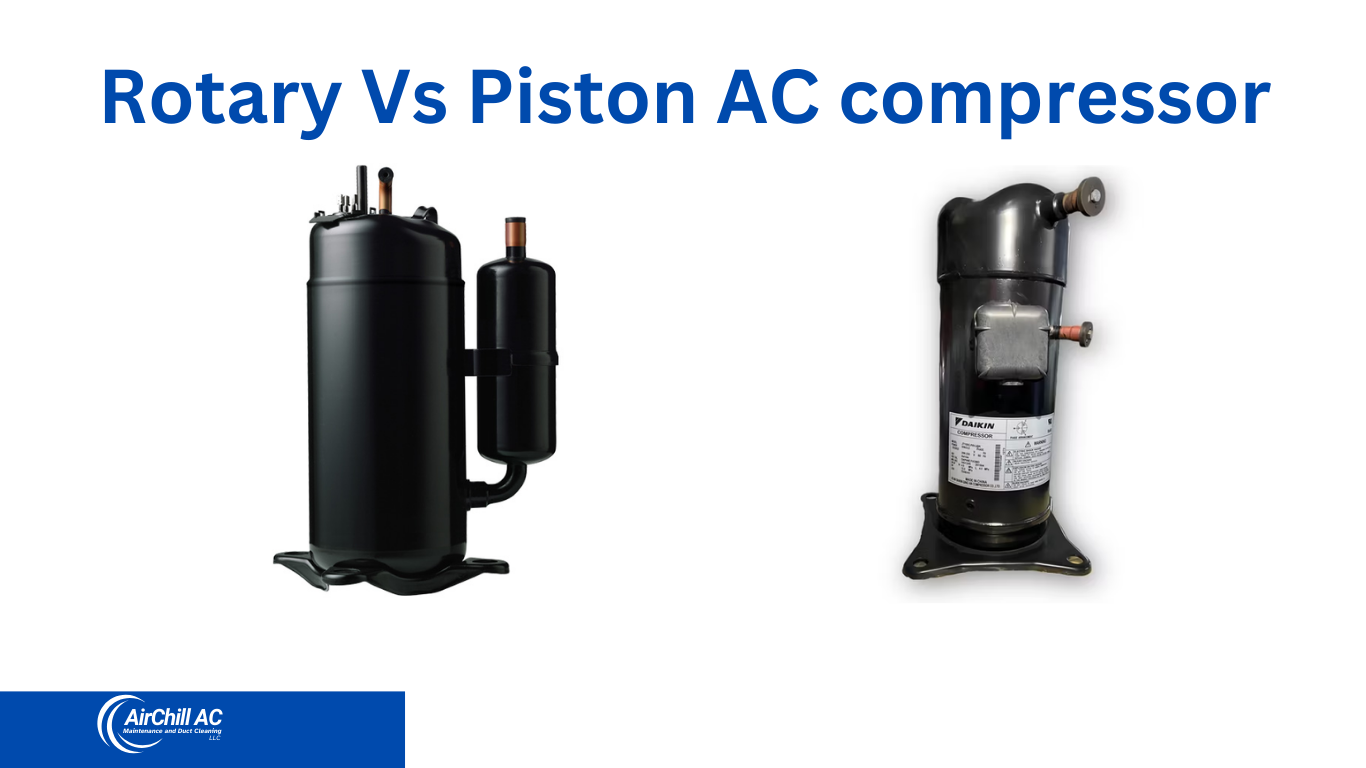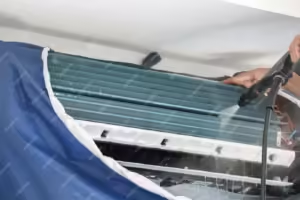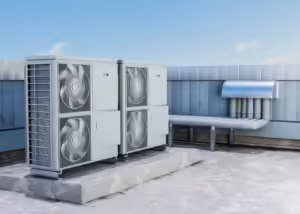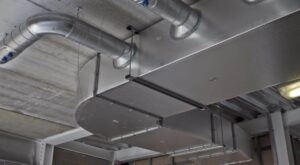Confuse Between Piston vs Rotary Compressor? When selecting an air conditioning system in Dubai, Sharjah, and throughout the UAE, one of the most important considerations is the type of compressor used in the AC unit. The two most commonly used compressors are piston compressors and rotary compressors. Both offer distinct advantages and drawbacks depending on your specific needs, but one might be better suited for the harsh climate and cooling demands of the UAE.
Rotary Compressor vs Inverter Compressor in AC: Which is Best for Your Split AC?
When choosing an air conditioner, one of the key decisions is the type of compressor it uses. Among the most popular types are rotary compressors and inverter compressors, each with its own advantages. If you’re wondering which compressor is best for split AC systems, this guide will walk you through everything you need to know, including how different compressors work, their prices, sizes, and more.
Understanding the Basics: Rotary Compressor Working Principle
The rotary compressor working principle involves a rotating mechanism that compresses refrigerant gas. It typically uses rollers or blades inside a cylinder, providing smooth and continuous airflow. This type of compressor is efficient, compact, and often quieter compared to traditional reciprocating compressors.
Inverter Technology: A Game-Changer in Modern ACs
Inverter compressors adjust their speed based on cooling demand, making them more energy-efficient. When comparing a rotary compressor vs inverter compressor in AC, remember that “inverter” refers to the technology managing compressor speed — many inverter ACs still use rotary-type compressors for the actual compression.
Scroll Compressor vs Piston Compressor
Another comparison often made is scroll compressor vs piston compressor. Scroll compressors, with fewer moving parts, offer quiet operation and reliability. Piston compressors (also called reciprocating compressors) use pistons to compress refrigerant and are generally more rugged but noisier and less efficient.
Exploring Rotary Compressor Types
- Rotary compressor AC units are known for their reliability and lower noise.
- Rotary screw compressors, commonly used in industrial settings, use twin rotors to compress air efficiently.
- Comparing piston vs rotary compressor vs screw gives insight into where each type excels: piston for durability, rotary for compact applications, and screw for large-scale operations.
Comparing Cost and Size: Piston vs Rotary Compressor
- Piston vs rotary compressor size: Rotary compressors are typically smaller and more compact, ideal for residential split AC units.
- Piston vs rotary compressor price: Piston compressors can be cheaper upfront but may cost more in electricity over time.
- Piston vs rotary compressor cost also includes maintenance — rotary units generally need less frequent servicing.
- If you’re looking for an overview in document form, a piston vs rotary compressor PDF can be helpful for technical comparisons and specs.
Choosing the Best Compressor for Split AC
So, which compressor is best for split AC? If energy efficiency, quiet operation, and long-term savings matter most, a rotary inverter compressor is often the top choice. However, for budget-friendly and rugged performance, piston compressors still hold value, especially in heavy-duty use cases.
Visual Learning: Rotary Compressor Diagram
For a better understanding of how these systems operate, a rotary compressor diagram can visually demonstrate the internal components and airflow, helping consumers and technicians alike.
Piston vs Rotary Compressor
Features of Piston Compressors
Overview: When you need ac repair in Dubai, Piston compressors are a type of positive displacement compressor commonly used in high-capacity air conditioning systems. They rely on a piston moving back and forth inside a cylinder to compress the refrigerant. This mechanism makes them highly effective in applications that require large volumes of refrigerant to be circulated at high pressure.
Advantages:
- High Cooling Capacity: Piston compressors are ideal for handling large refrigerant volumes, making them well-suited for high-capacity systems.
- Durability and Longevity: These compressors are known for their robust construction, which can withstand continuous operation in harsh conditions.
- Better for Larger Spaces: Given their capacity to handle significant loads, piston compressors are often used in larger commercial and residential cooling systems in high-demand areas like Dubai and Sharjah.
Disadvantages:
- Higher Energy Consumption: Piston compressors tend to consume more energy compared to rotary compressors, especially in smaller systems.
- Higher Noise Levels: They can be noisier due to their moving parts and design.
- More Expensive: Piston compressors generally come with a higher upfront cost, both in terms of purchase and maintenance.
Features of Rotary Compressors
Overview: Rotary compressors are a type of positive displacement compressor that relies on a rotating mechanism to compress the refrigerant. These compressors come in two main types: vane-type and screw-type, with vane-type being the most common for residential and small commercial use.
Advantages:
- Energy Efficient: Rotary compressors tend to be more energy-efficient compared to piston compressors, especially in smaller or mid-sized systems.
- Quieter Operation: Rotary compressors operate more quietly and smoothly due to their simpler design with fewer moving parts.
- Compact Size: They are more compact, making them ideal for space-limited areas or smaller systems.
Disadvantages:
- Lower Cooling Capacity: Rotary compressors may not be able to handle the high cooling demands of larger spaces as effectively as piston compressors.
- Less Durable in High Demand: In extremely high temperatures and continuous operation, rotary compressors may experience performance issues over time.
- Less Suitable for Large Systems: These compressors are more suitable for smaller residential spaces or businesses with lower cooling requirements.
Final Thoughts: Piston vs Rotary Compressor
When deciding between a piston or rotary compressor for your AC system in Dubai, Sharjah, or the UAE, the final choice often depends on several factors, including your specific cooling requirements, budget, and preference for energy efficiency.
- If you’re looking for higher cooling efficiency and have a larger space or commercial application, piston compressors are the way to go. While they come with a higher price tag and more energy consumption, their durability and capacity make them the preferred option for handling large loads and extreme temperatures.
- If energy efficiency and lower upfront costs are more important to you, and your cooling needs are more modest, rotary compressors offer a more cost-effective solution. They are quieter and more efficient in smaller systems, but they may not provide the same level of performance in extremely high-demand conditions.
Ultimately, it’s your choice based on what best suits your needs – whether that’s opting for a more energy-efficient, cost-friendly solution or investing in a higher-performing compressor for superior cooling efficiency.
Need Help or Professional Assistance?
If you’re unsure about which compressor type is best suited for your needs or if you need help with ac installation, maintenance, or repair, don’t hesitate to contact us today. Our team of professionals is ready to assist you with expert advice and services tailored to your cooling requirements.
Call now at 058 177 7258 to speak with one of our experts and get personalized ac maintenance and duct cleaning recommendations for your AC system.
❓ Frequently Asked Questions (FAQs)
1. Which compressor is better, a rotary or a piston?
Rotary compressors are more energy-efficient, compact, and quieter, making them ideal for residential AC units. Piston compressors are more rugged and better suited for heavy-duty or industrial applications.
2. What are the disadvantages of rotary compressors?
Rotary compressors can be more expensive upfront, and they may not handle very high-pressure applications as well as piston compressors.
3. Which type of compressor is best for AC?
For residential air conditioners, rotary and scroll compressors are typically the best due to their efficiency and low noise. Inverter-driven rotary compressors are especially popular in modern split ACs.
4. Is a rotary compressor better than a normal compressor?
If by “normal compressor” you mean piston-type, then yes — a rotary compressor is generally quieter, more compact, and energy-efficient.
5. Which compressor has highest efficiency?
Scroll compressors and inverter rotary compressors offer the highest efficiency, especially when paired with smart temperature controls in split or central AC systems.
6. Which is better: rotary compressor or scroll compressor AC?
Scroll compressors are quieter and slightly more efficient, but rotary compressors are more affordable and compact. The best choice depends on your usage and budget.
7. What is the life of a rotary compressor?
With proper maintenance, a rotary compressor can last anywhere from 8 to 15 years, depending on usage and operating conditions.
8. What are the disadvantages of the rotary system?
Rotary systems may not perform well under fluctuating load conditions and can be costlier to repair if internal damage occurs.
9. Which compressor lasts the longest?
Scroll compressors tend to have the longest lifespan due to fewer moving parts and minimal friction during operation.
10. Is rotary better than piston?
For home use and split AC systems, rotary is better due to efficiency and noise control. However, piston compressors still win for durability in rough environments.
11. What are the advantages of piston compressors?
Piston compressors are simple to repair, work well under variable load conditions, and can handle high-pressure applications with ease.
12. Which type of air compressor is best?
For industrial use, rotary screw compressors are ideal due to continuous operation and high efficiency. For home or workshop use, rotary or piston compressors work best depending on needs.





